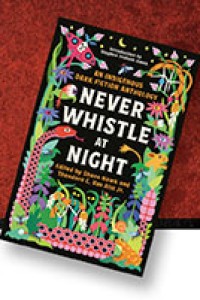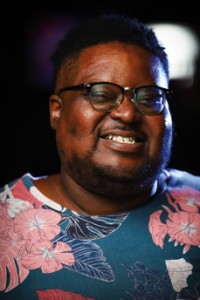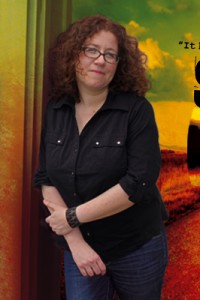Connie Willis: Open Channel

Constance Elaine Trimmer Willis was born December 31, 1945 in Denver CO and has lived in Colorado most of her life. She earned a BA in English and elementary education from the University of Northern Colorado, Greeley, in 1967, and taught elementary and junior high school from 1967-81. She wrote some during this period, making her first SF sale to Worlds of Fantasy with ‘‘The Secret of Santa Titicaca’’ (1971), and earned her first Hugo nomination for ‘‘Daisy in the Sun’’ (1979). In 1982, she received a National Endowment for the Arts grant, which enabled her to write full time. That year, Hugo- and Nebula-winning novelette ‘‘Fire Watch’’ and Nebula-winning story ‘‘A Letter from the Clearys’’ appeared, the first of her many award-winning stories, which so far include 11 Hugos and seven Nebulas – more than any other SF writer – and a dozen Locus Awards.
First novel Water Witch (1982) was a collaboration with Cynthia Felice; they also wrote Light Raid (1989) and Promised Land (1997) together. First solo novel Lincoln’s Dreams (1987) won the John W. Campbell Memorial Award, and her second, Doomsday Book (1992), won both the Hugo and Nebula and a Locus Award. Uncharted Territory and Remake (Locus Award winner and Hugo nominee) appeared in 1994, followed by Locus Award Winner and Nebula finalist Bellwether (1996), Hugo winner and Nebula nominee To Say Nothing of the Dog (1998), and Passage (2001), winner of a Locus Award and finalist for both the Hugo and the Nebula. Time travel duology Blackout/All Clear (2010) won Hugo, Locus, and Nebula Awards, and was a Campbell Memorial Award finalist. Her latest novel, Crosstalk, is a romantic comedy about telepathy.
Willis is a celebrated short fiction writer, and her award-winning works include ‘‘The Last of the Winnebagos’’ (1988, Hugo and Nebula winner), ‘‘At the Rialto’’ (1989, Nebula winner and Hugo finalist), ‘‘Even the Queen’’ (1992, Hugo, Nebula, and Locus Awards winner), ‘‘Death on the Nile’’ (1993, Hugo Winner, Nebula and Bram Stoker Award nominee), ‘‘Close Encounter’’ (1993, Locus Award winner), ‘‘The Soul Selects Her Own Society: Invasion and Repulsion: A Chronological Reinterpretation of Two of Emily Dickinson’s Poems: A Wellsian Perspective’’ (1996, Hugo winner), ‘‘Newsletter’’ (1997, Locus Award winner), ‘‘The Winds of Marble Arch’’ (1999, Hugo winner and World Fantasy Award finalist), ‘‘Inside Job’’ (2005, Hugo Winner, Theodore Sturgeon Memorial Award finalist), and ‘‘All Seated on the Ground’’ (2007, Hugo winner). Other notable stories include Hugo and Nebula nominees ‘‘The Sidon in the Mirror’’ (1983) and ‘‘Jack’’ (1991); Hugo finalists ‘‘Spice Pogrom’’ (1986), ‘‘Time Out’’ (1990), ‘‘Cibola’’ (1990), ‘‘In the Late Cretaceous’’ (1991), ‘‘Miracle’’ (1991), ‘‘Just Like the Ones We Used to Know’’ (2003); Nebula nominee ‘‘Schwarzschild Radius’’ (1987); and World Fantasy finalist ‘‘Chance’’ (1986). Many of her stories have been collected in Fire Watch (1985), Locus Award winning Impossible Things (1993), Miracle and Other Christmas Stories (1999), The Winds of Marble Arch and Other Stories (2007), and The Best of Connie Willis (2013).
Willis also edited anthologies The New Hugo Winners Volume III (1994, with Martin H. Greenberg), Nebula Awards 33 (1999), and A Woman’s Liberation: A Choice of Futures By and About Women (2001, with Sheila Williams). She is a frequent speaker and guest of honor at SF conventions, and much sought-after as a Toastmaster. Willis was inducted into the Science Fiction Hall of Fame in 2008, and was named a SFWA Grand Master in 2011. She lives in Greeley CO with her husband Courtney (married 1967), and they have an adult daughter, Cordelia.
Excerpts from the interview:
‘‘Crosstalk was calling to me, and for various reasons I thought it was time to write it. First, though, I have to get this onto the record: there is another Connie Willis out there. I discovered that when I was giving a speech at Colorado State University. They were introducing me and said, ‘She’s written all these books and won these awards,’ and then they said, ‘and she’s frequently a host on the radio show Coast to Coast. She claims to have lived past lives, she’s been abducted by aliens, and she’s a psychic.’ I was waving at them from the back of the room. I said, ‘I don’t know who you’re talking about, but that’s not me.’ They were very disappointed because they thought I believed in telepathy. I was like, ‘No, I write science fiction. Fiction is the word. Fiction.’ I went home and looked up the other Connie Willis, and yes, she’s a co-host on Coast to Coast. It’s a late night crazy radio show where they have Sasquatch and the Loch Ness Monster, and yes, she has past lives and she’s a psychic. She’s all these things I have spent my entire life trying to convince people I’m not, because I’m a science fiction writer and they always get confused. I’m really unhappy she’s out there.
‘‘I was trying to explain to that audience that there are lots of stories about psi powers, and I love those stories, they’re great – but they’re usually grim. Either the characters go mad because they hear all these voices, which makes a lot of sense, or they use their powers to commit crimes or gain power, or it makes them ill. I thought, ‘Nobody’s written a comedy about the funny side of telepathy, and that would be fun.’ It’s an interesting challenge for a romantic comedy, because romantic comedies are based on misunderstandings and miscommunications. If you open this channel where you really do know what people are thinking, that should eliminate that problem, so you’d have to create other barriers. I thought that would be really fun to do.”
…
‘‘In Crosstalk there’s a surgery that lets you sense your partner’s emotions. People are using it as a prenuptial agreement, or as a way to enhance their relationship. There’s only one real way to enhance your relationship: work on it. Live with each other. Help each other. Try to understand each other. I love writing romantic comedies, because it’s the only genre that deals with real adult relationships. Romance is a different thing – I don’t like romance, and I’ve never written romance. It’s about seducing and being seduced, wooing and being won, and the power differential is incredible, there’s no equality at all. Whereas in a romantic comedy relationship, you see through the person’s facade, you’re not fooled by it for a minute while the rest of the world is, and you demand that the person be a good person.”
…
‘‘You really can’t teach comedy. You can teach a number of techniques, but you can’t teach the comic temperament, or the comic way of looking at things. I know that, because I’ll tell people a story I’ve read, or a story I’ve seen in the paper, and to me I can see all the funny sides, and they’ll say, ‘That’s so tragic.’ I’m like, ‘Yes, but there’s a funny side to it.’ They just can’t see it. So there’s a temperament you have, but you have to build on it by developing skills to get it onto the page. It’s hard to have that comic temperament in this society. We’re encouraged not to be ironic at all. Comedy is such an unforgiving medium, too. If you write a serious novel, it can have really brilliant parts and pretty good parts and a few wobbly parts, but it still works as a serious novel. A comedy has to work on every page, in every line. It can’t not work, because if it doesn’t, it’s horrible. Comedy’s either really good or just awful – there’s no middle ground. That makes it harder.”
…
‘‘What’s next? The UFO novel is still next on my list. It was next last time, and then it got superseded by Crosstalk. I’m working on it right now, and I was plotting it in the car as we drove from Colorado to Kansas City for Worldcon. It’s something I’ve always wanted to write. There were a couple of reasons to put it on the back burner – various movies had come out that I thought might conflict with it. That’s no longer an issue, because those movies sank without a trace. When I wrote Lincoln’s Dreams, I worked on that book for five years. The focus was a great deal about Robert E. Lee and his horse Traveler. Then two months later Richard Adams, the guy who wrote Watership Down, brought out a book called Traveler. Of course he was way more famous than me. I was like, ‘Oh, my God, this is going to completely sink my book.’ I’ve had that happen a couple of times, usually with short stories, and it’s easy to wait a couple of years and then write the short story… but when it’s a novel and you’re putting so much time in, you really don’t want every review to say, ‘Clearly derivative,’ even though it’s not.
‘‘I’m definitely going ahead with the UFO book, for several reasons. One, I think the whole Roswell UFO thing is insanely ridiculous, and lovely. It’s full of examples of human avarice and gullibility, and willingness to be fooled. Two, I’ve always loved road movies, where you have the mismatched group who have to travel together for some reason – a ragtag band wandering through the American landscape together. Three, I love the Southwest, and I love Westerns, and I want a book in which I can talk about Westerns, and Western moviemaking, and the Western landscape.”
…
‘‘What advice would I give to writers? I’d say: listen to everything everybody tells you, particularly the things that are wrong with your writing, and at the same time ignore everything else. When I took ‘Fire Watch’ to Milford to be critiqued, the first thing everybody said to me was, ‘You can’t write time travel. Time travel is dead.’ I said, ‘I wrote it. I’m writing time travel. I like time travel.’ That would have been terrible advice to listen to, obviously. I’ve based my career on time travel! They weren’t wrong, though. Time travel was totally moribund at that point, but I’d figured out something new to do with it. It didn’t matter if it wasn’t selling. I wanted to tell that story. You have to ignore the people who say you can’t write the story you want to write. You should not chase the trends. By the time you start chasing a trend, it’s over. You’ve got to figure out what you want to write, and then ignore everyone who tells you there’s no such thing.”
Read the complete interview in the October 2016 issue of Locus Magazine. Interview design by Francesca Myman.






‘Romance is a different thing – I don’t like romance, and I’ve never written romance. It’s about seducing and being seduced, wooing and being won, and the power differential is incredible, there’s no equality at all.’
There is a lot of romance out there like that, but there’s also a lot that isn’t, where the romance is between equal partners. Connie Willis is doing the equivalent of dismissing SF as being about talking squids in outer space.